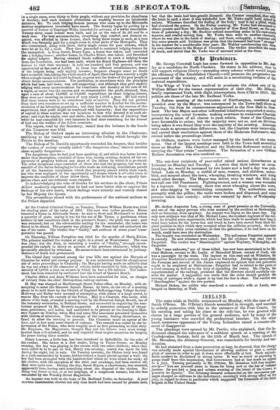abe Viobirats.
Mr. George Cornwall Legh has come forward in opposition to Mr. Ast. ley as a candidate for North Cheshire. He states in his address, that he will support religious liberty—excepting every scheme which would impair the efficiency of the Established Church—will promote the progressive im- provement of the country, and will assist in a scrutinizing revision of the national expenditure.
The Whigs of York have resolved to nominate the eldest son of Sir William Milner for the vacant representation of their city. Mr. Mikes", family represented York, with slight interruptions, from 1722 to 1811. Zs politics are those of the late Mr. Redhead Yorke.
A Reform meeting of the townsmen of Northampton, convened aim presided over by the Mayor, was commenced in the Town-hall there oir Tuesday, but from its numerousness adjourned to the New Hall in New. land. The late Mayor and other influential inhabitants supported a motion incorporating the usual formula; making overtures to numerous Chartists present for a union of all classes to push reform. Some of the Chartists were favourable to union; but the majority were not so, and on divisions being taken it was found they were the majority of the meeting. Attempts were made to accommodate differences, but the Chartists were inexorable and carried their resolutions against those of the Moderate Reformers; who retired before the proceedings closed.
At Oldham, matters were better managed by the leaders of the move. ment. One of the largest meetings ever held in the Town-hall assembled there on Monday. The Chartists and the Moderate Reformers united in carrying the " four points " resolutions. The formation of a new Oldham Reform Association was also resolved on.
The out-door recipients of poor-relief raised serious disturbances at Leicester on Monday and Tuesday. A notice that their labour at stone- breaking, Fee. would be increased by two hours and a half a day was pub- lished. Late on Monday, a rabble of men, women, and children, assem- bled, and strayed about the town, whooping, breaking windows, and doing much other damage. The Mayor was driven even to read the Riot Act and call out 160 Pensioners. Fighting ensued, and a woman was wounded by a bayonet. Next evening, there was more whooping about the town, and alms-begging by intimidating companies. The authorities acted promptly with the police; the mobs were broken and dispersed, and some persons taken into custody: order was restored by dawn of Wednesday
morning. 3
•
Mr. Arthur Augustus Lea, a young man of great promise at the University, and one of the many persona who were maimed by the accident at Shrivenham, died on Saturday, from apoplexy. An inquest was begun on the same day. The only new evidence was that of Mr. Michael Lane, the resident engineer of the rail- way: he detailed some experiments which had been made to ascertain how long it must have taken for the horse-box and truck to have been moved from their ori- ginal position to that which they occupied when the collision occurred; the time must have been fully seven minutes; so that the policeman, if he had been on the watch, could have seen the obstruction.
The inquiry was concluded on Wednesday. The policeman Pargetter appeared in custody. No new witnesses were called; but the evidence was read over to Pargetter. The verdict was " Manslaughter " against Weybury, Willoughby, am! Pargetter.
The "man unknown," one of those killed, has now been ascertained to be Mi- chael Mahony, servant to Mr. Leahy, of Shanakiel House, county of Cork, who was a passenger by the train. The inquest on this man and on Wiltshire, Sir Alexander Mackenzie's servant, took place on Saturday. During the proceedings, the Foreman and several of the Jurors expressed an opinion that two policemen ought to be employed at Shrivenham: Pargetter had to attend to the gates at a level crossing as well as to the duty of signalling the trains. Mr. Clarke, the superintendent of the railway, promised that the directors should carefully con- sider the matter. A suggestion was made that the rides should prohibit the moving of carriages while a signal is up that the line is clear. The verdict was "Manslaughter" against the two porters.
Michael Stokes, the soldier who murdered a comrade's wife at Leeds, was hanged on Saturday, at York.






















 Previous page
Previous page